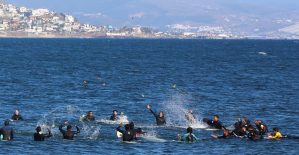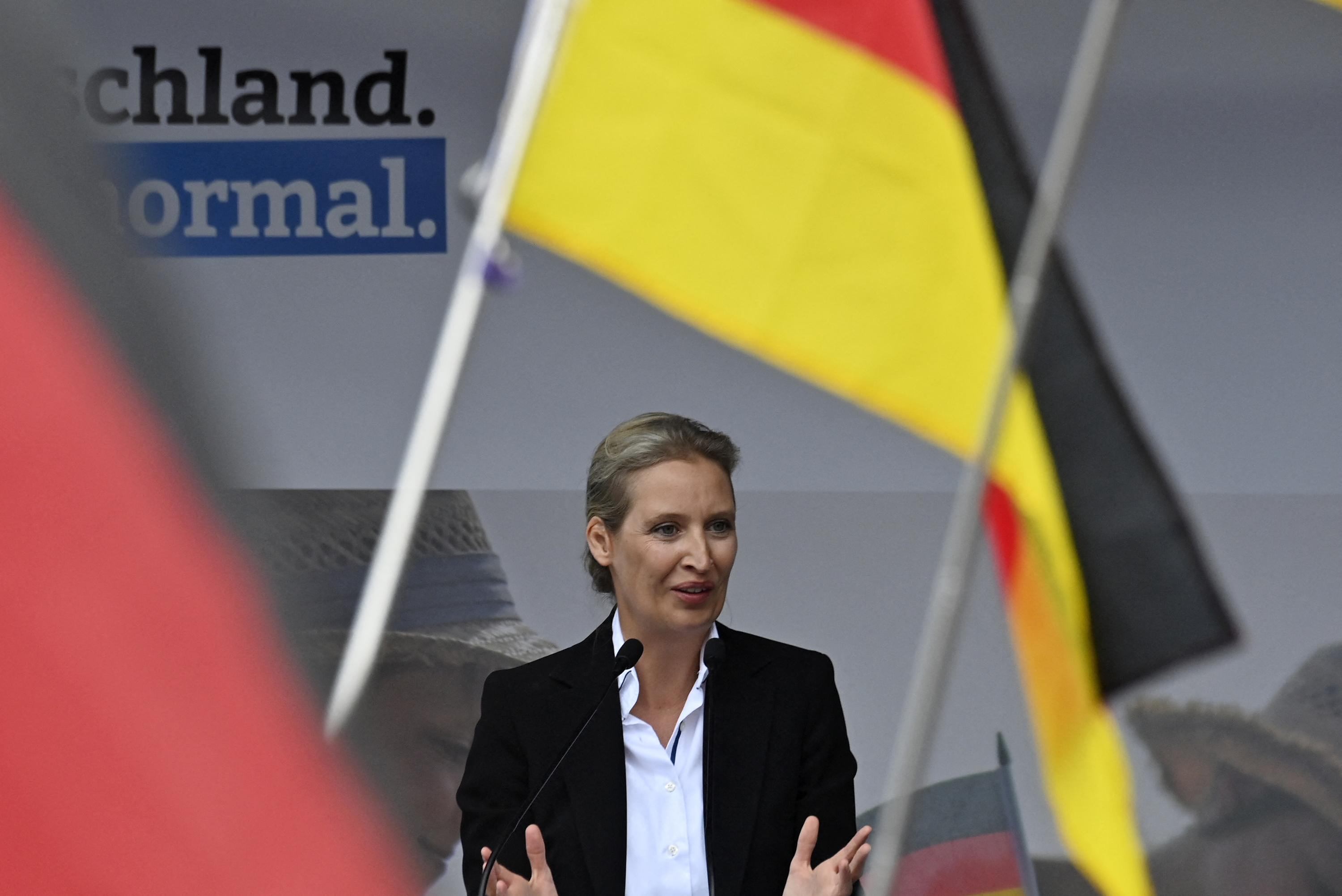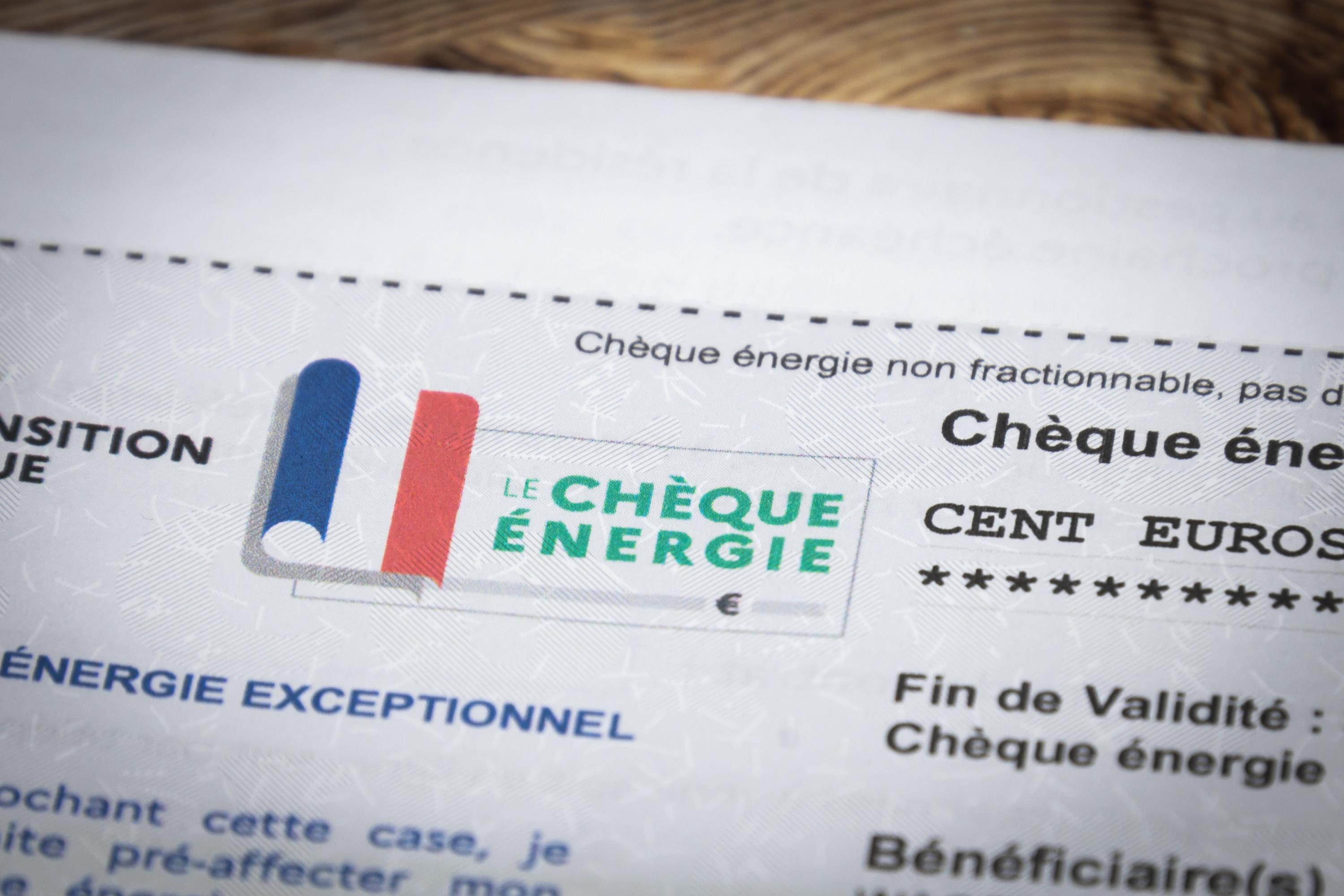The start of 2024 was intense on the German domestic political scene. After the revelation of a secret plan for the “re-migration” of millions of people with immigrant backgrounds, with or without German passports, drawn up by AfD executives and representatives of the right wing of the CDU in case of access to power, hundreds of thousands of people have demonstrated across the country in recent weeks.
On Saturday, 150,000 demonstrators gathered in Berlin in front of the Reichstag which houses the German parliament, at the call of several civil society organizations. “It is difficult not to draw a parallel between what is happening in the country today and the situation at the time of the Weimar Republic,” a demonstrator told Le Figaro, reflecting the feeling of thousands of people. Germans who have taken to the streets since mid-January.
If the historical parallel is not necessarily verified against the background of the programs of the nationalist party founded on February 6, 2013 and the national socialist party which led Hitler to power, the progression in the polls - and in the ballot boxes - of the AfD today Today is undeniable.
For eleven years to the day, the party has gone from a few percent in the polls to more than 20% of the votes today, according to German polling institutes which publish every month, and sometimes every week, a survey on the intentions of vote at the federal level. If the party has lost 2 to 3% in the three polls published since the defeat of the AfD in Thuringia, the German nationalist party maintains for the moment its status as the second political force in the country, behind the coalition of Christian Democrats of the CDU and their Bavarian allies the CSU. The scores were reflected at the ballot box with respectively 4.7%, 12.6% and 10.3% of votes collected in the Bundestag in 2013, 2017 and 2021.
Founded by liberal economists who opposed the European policy of bailing out Greece, the Afd achieved a decisive score in the European elections one year after its creation, in June 2014, winning 7.1% of the votes. But the real turning point came in 2015. “The refugee crisis is the main factor in the AfD’s breakthrough,” explains political scientist Patrick Moreau. “On August 31, 2015, Angela Merkel’s phrase “Wir schaffen das!” (“We will get there!”) becomes the symbol of a society open to the misery of the world,” also explains the specialist, recalling that in one year, 900,000 migrants and refugees were registered in Germany. With 18% of voting intentions, the new populist national party is at its highest level, attracting the anti-immigration electorate.
Geographically, the AfD obtains much more convincing results in the former Länder (States) of the GDR. “The incompleteness of reunification was a shock for the inhabitants of the East (due to deindustrialization, the arrival of Western elites to responsibilities and the feeling of not being represented by political parties) and led to a phenomenon of rejection of the political system” which the AfD perfectly captures, explains Patrick Moreau.
If the party has not managed to come to power in Thuringia, the next regional elections will take place in Saxony and Brandenburg, where the political force is credited with 32% and 35% of the votes, each time ahead of the conservative right of the CDU, according to two Forsa polls published in January.
But from spring 2020, the party experienced a relative decline, which caused it to remain at the 10% mark in voting intentions for more than two years. The Covid pandemic and then the war in Ukraine undoubtedly provoke a legitimist reflex in the electorate which then turns to the historic parties, established in the institutions at the expense of the protest groups.
But this period is above all the result of an internal crisis within the party, according to Patrick Moreau. “There were several currents, including a national-liberal, at the origin of the creation of the party, and a national-völkisch (which means popular in the ethnic sense) which can be described as racialist. The latter allied himself with the neoconservatives who represented the third line. After this internal battle, many activists of the national liberal line left, explains the political scientist. The party has restructured itself to have a common organization in both the East and the West.”
Also read: The farmers' crisis precipitated the European election campaign
Today, the AfD claims 40,131 members compared to 10,000 at its creation. “The party is now dominated by national völkisch,” underlines Patrick Moreau. He clarified his line by radicalizing it, with a very anti-immigration speech, particularly that from Ukraine, anti-Islam, anti-woke and anti-feminist. The AfD in fact accompanies, as often elsewhere in Europe, a phenomenon of political polarization. The eastern regions thus tended to vote more for this radical right which combines the deep rejection of pro-Ukrainian policy, the Covid vaccination policy, or even the environmentalist policy of the federal state. Conversely, certain regions in the West, such as Baden-Württemberg, the two Rhinelands or the state of Schleswig-Holstein, saw their score for the AfD decrease.
The astonishing progression in the polls, historic from the point of view of its eleven years of existence, should therefore allow the AfD to record a better score in the European elections next June, improving its performance in 2019. In a survey of the Wahlkreisprognose Institute published on January 18, the party is credited with 23% of voting intentions.
It remains to be seen whether the nationwide mobilizations against this rise in power since the beginning of the month will have an impact at the polls. Five polling institutes pointed out in a latest survey after the defeat of the AfD in Thuringia, a loss of 3 to 4% in voting intentions.

 Israel-Hamas war: Gaza between hope of truce and fear of Israeli offensive in the South
Israel-Hamas war: Gaza between hope of truce and fear of Israeli offensive in the South “Mom, Dad, please don’t die”: in the United States, a nine-year-old child saves the lives of his parents injured in a tornado
“Mom, Dad, please don’t die”: in the United States, a nine-year-old child saves the lives of his parents injured in a tornado War in Ukraine: Putin orders nuclear exercises in response to Macron and “Western leaders”
War in Ukraine: Putin orders nuclear exercises in response to Macron and “Western leaders” Mexico: the last moments of surfers found in a well, killed with a bullet to the head
Mexico: the last moments of surfers found in a well, killed with a bullet to the head A baby whose mother smoked during pregnancy will age more quickly
A baby whose mother smoked during pregnancy will age more quickly The euro zone economy grows in April at its best pace in almost a year but inflationary pressure increases
The euro zone economy grows in April at its best pace in almost a year but inflationary pressure increases Children born thanks to PMA do not have more cancers than others
Children born thanks to PMA do not have more cancers than others Breast cancer: less than one in two French women follow screening recommendations
Breast cancer: less than one in two French women follow screening recommendations “A potential environmental disaster”: Paris town hall opposes an oil drilling project in Seine-et-Marne
“A potential environmental disaster”: Paris town hall opposes an oil drilling project in Seine-et-Marne The governor of the Banque de France pleads for the development of French and European AI
The governor of the Banque de France pleads for the development of French and European AI Clariane (ex-Korian) announces a sale of its home hospitalization activities
Clariane (ex-Korian) announces a sale of its home hospitalization activities To everyone's surprise, the Hades 2 event video game is released in early access
To everyone's surprise, the Hades 2 event video game is released in early access The Origin of the World, exhibited at the Center Pompidou Metz, target of an “artistic performance”
The Origin of the World, exhibited at the Center Pompidou Metz, target of an “artistic performance” Threatened with death for having insulted the mobilized pro-Palestinian students, Élie Semoun files a complaint
Threatened with death for having insulted the mobilized pro-Palestinian students, Élie Semoun files a complaint Vienna, Paris, Milan celebrate the 200th anniversary of Beethoven's 9th Symphony
Vienna, Paris, Milan celebrate the 200th anniversary of Beethoven's 9th Symphony Cannes Film Festival: call for strike one week before opening
Cannes Film Festival: call for strike one week before opening Omoda 7, another Chinese car that could be manufactured in Spain
Omoda 7, another Chinese car that could be manufactured in Spain BYD chooses CA Auto Bank as financial partner in Spain
BYD chooses CA Auto Bank as financial partner in Spain Tesla and Baidu sign key agreement to boost development of autonomous driving
Tesla and Baidu sign key agreement to boost development of autonomous driving Skoda Kodiaq 2024: a 'beast' plug-in hybrid SUV
Skoda Kodiaq 2024: a 'beast' plug-in hybrid SUV The home mortgage firm rises 3.8% in February and the average interest moderates to 3.33%
The home mortgage firm rises 3.8% in February and the average interest moderates to 3.33% This is how housing prices have changed in Spain in the last decade
This is how housing prices have changed in Spain in the last decade The home mortgage firm drops 10% in January and interest soars to 3.46%
The home mortgage firm drops 10% in January and interest soars to 3.46% The jewel of the Rocío de Nagüeles urbanization: a dream villa in Marbella
The jewel of the Rocío de Nagüeles urbanization: a dream villa in Marbella Europeans: David Lisnard expresses his “essential and vital” support for François-Xavier Bellamy
Europeans: David Lisnard expresses his “essential and vital” support for François-Xavier Bellamy Facing Jordan Bardella, the popularity match turns to Gabriel Attal’s advantage
Facing Jordan Bardella, the popularity match turns to Gabriel Attal’s advantage Europeans: a senior official on the National Rally list
Europeans: a senior official on the National Rally list Blockade of Sciences Po: the right denounces a “drift”, the government charges the rebels
Blockade of Sciences Po: the right denounces a “drift”, the government charges the rebels These French cities that will boycott the World Cup in Qatar
These French cities that will boycott the World Cup in Qatar Foot: Italian football protests against a government project which aims to monitor club finances
Foot: Italian football protests against a government project which aims to monitor club finances Champions League: “We are ready for anything,” warns Edin Terzic before PSG-Dortmund
Champions League: “We are ready for anything,” warns Edin Terzic before PSG-Dortmund Premier League: David Moyes to leave West Ham at end of season
Premier League: David Moyes to leave West Ham at end of season Transat CIC: Yoann Richomme winner in the wake of Tabarly, Poupon, Peyron, Desjoyeaux...
Transat CIC: Yoann Richomme winner in the wake of Tabarly, Poupon, Peyron, Desjoyeaux...


















